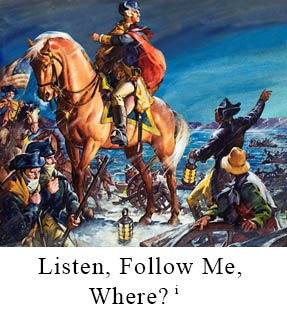If it wasn’t for people . . . only very visible leaders would listen and lead.
Last week we discussed what we should listen for, that “still small voice.” But the Blog featured the example of George Washington and the Continental Army under famine conditions during the winter of 1776-1777 at Valley Forge. Now those were some high stakes and General Washington prayed about those circumstances and the way forward. What was he to do, “listen.” History tells us the rest.
But what if you the “leader” are not the commander of an army, lead pastor of a church, or CEO of an international corporation? What if you the “leader” have responsibility for just a few people, maybe a small assembly team in a production facility, a children’s ministry team, an aircraft commander, or squad leader in our Army or Marines? Are those decisions any less difficult or less important than decisions made at the highest levels of our government? I think not.
First, the greatest span of control any leader really has over subordinates shouldn’t be more than 7-12 people. Realistically, that is the constraint most people experience in leadership. So, I suspect that except for exhortations and displays of courage during the battle where many of General Washington’s followers saw him, probably from afar, he could only really impact the lives of a few of his closest lieutenants.
Second, decisions made at the lowest level of an organization can still have life or death consequences and they too can impact the whole organization, for better or for worse. If anything, those decisions can be more difficult because you are constrained by factors beyond your control or time precludes you from seeking guidance from the next higher level when you face disaster. Yet you still must act and do it right. Have you been “listening?”
Third, you the “leader,” be it team captain, ministry team leader, single pilot, or squad leader, are in a position to profoundly influence the personal lives of those closest to you. When you the “leader” make decisions, you may have the intimate inclusion in the process of those for whom you are responsible, and those people will see clearly the veracity of your character, the true heart, and soul of you the “leader.” It is through these processes and through those decisions and through those relationships with those for whom you are responsible, that you the “leader” can have an eternal impact on those very people. And do you want to know where the rubber meets the road, right close and personal when you exercise leadership within your family?
So never think for a minute, that where you sit in an organization is any less important than one who has a responsibility for a great number of people. Sure, if you are responsible for many people and the future of your country is a stake, like in General Washington’s situation, you may impact the lives and wellbeing of many people for years to come. It may also create a general climate where people find it is easier to do the harder “right” than the more expedient wrong. But I suspect that only Washington’s closest lieutenants with whom he suffered long and dangerous hardships, really had their character directly influenced. If you have responsibility for (or even exercise informal leadership over) just a few people, you can have an impact on the hearts and souls of those people forever. So that means that achieving organizational success is critically important, but how you exercise leadership in the quest for success is every bit as important on the grand scale of eternity. That holds true for Generals, CEOs, and lead pastors, and it is true for you the “leader” of even the smallest group of people.
If you are a follower of Jesus, I can sum this discussion up as leading toward eternity where what you do and say may well impact where someone spends eternity, with or without God the Father, God the Son, and God the Holy Spirit. And you’ll never get it right unless you “listen” . . . to that “still small voice.” And listen, so you know when to say, “Follow Me.” Listen, George Washington did.
[1]George Washington Crossing the Delaware.





